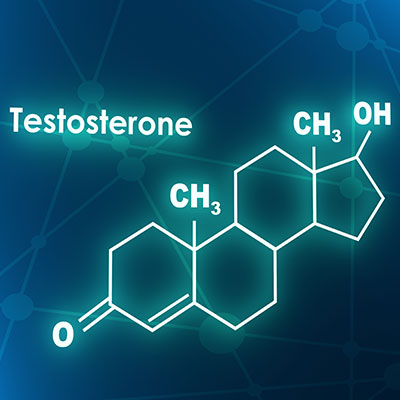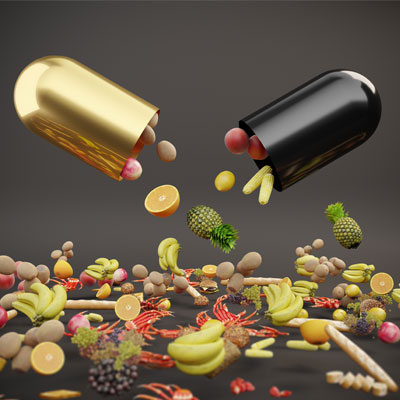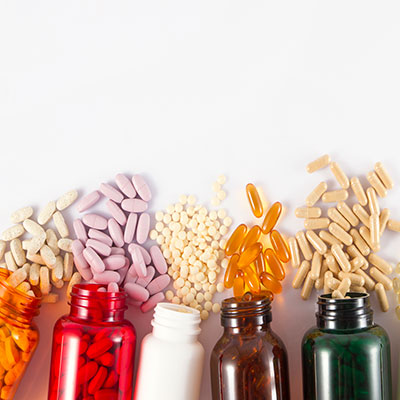How to Increase Free Testosterone
Contents
- What Is Free Testosterone?
- Is it Possible to Increase Free Testosterone?
- Can I Increase Free Testosterone Naturally?
- Foods You Should Eat to Boost Your Free Testosterone
- Foods to Avoid to Increase Your Free Testosterone
- Can Testosterone Replacement Therapy Increase Free Testosterone?
- What Do the Medical Studies Say About Boosting Testosterone?
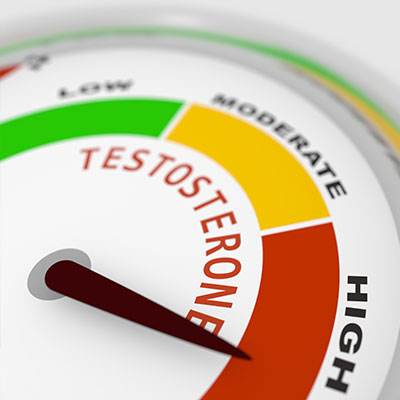
Testosterone is a critical hormone for both men and women. Unfortunately, we lose this critical hormone as we age. This age-related testosterone loss can be a real issue for men.
By the time a man is over 30, the level of testosterone in his blood can decrease by as much as 2% every year. As your testosterone drops, you can start to:
- Feel tired and sluggish
- Put on weight, particularly belly fat
- Develop sexual health issues
- Have difficulty with focus
- Have trouble building muscle, even when working out
- Have trouble sleeping
- Feel depressed, angry, or anxious
The good news is there are several lifestyle changes you can make that could naturally boost your free testosterone levels.
What Is Free Testosterone?
Testosterone is the most important male hormone. Most of the testosterone in your blood is attached to one of two proteins: albumin and sex hormone-binding globulin (SHBG). However, there is some testosterone in the bloodstream that is not attached to either albumin or SHBG. This is what doctors refer to as “free testosterone.”
The combination of both your protein-bound testosterone and free testosterone is your “total testosterone,” sometimes also referred to as “bioavailable testosterone.”
Is it Possible to Increase Free Testosterone?
Yes, there are absolutely several proven methods to increase your level of free testosterone.
- Exercise
Exercise is one of the most effective ways to boost your testosterone. Strength training, such as weightlifting or High-Intensity Interval Training, are the best exercises to boost testosterone. Such exercises also boosts your level of growth hormone. Exercise can also help you to lose weight. Obesity lowers your testosterone level.
- Sleep
Critical hormones such as testosterone and growth hormone are mostly produced during periods of deep sleep. Not getting enough sleep negatively impacts hormone production. Making sleep a priority is vital to maintain testosterone levels. Men should aim to sleep at least 7 to 8 hours each night.
- Reduce stress
Stress is a testosterone killer. High stress raises your levels of the hormone cortisol. Elevations in cortisol can quickly reduce testosterone.
- Vitamin D
Vitamin D is a precursor to testosterone production. It is crucial that men spend enough time in the sun (the main source of vitamin D) or take vitamin D supplements.
- Avoid alcohol
Abuse of alcohol lowers your testosterone.
- Nutritional supplements
Certain herbs and nutritional supplements have been shown to increase testosterone production. This includes ginseng, ginger, ashwagandha root, DHEA, and Yohimbe.
- Enjoy a healthy sex life
Men will be happy to know that having sex regularly can increase testosterone production.
Can I Increase Free Testosterone Naturally?
In addition to using the above lifestyle changes to naturally raise your free testosterone levels, what you eat impacts your testosterone levels. Here are some foods to eat and some foods to steer clear of if you want to raise your free testosterone or maintain a healthy level of total testosterone.
Foods You Should Eat to Boost Your Free Testosterone
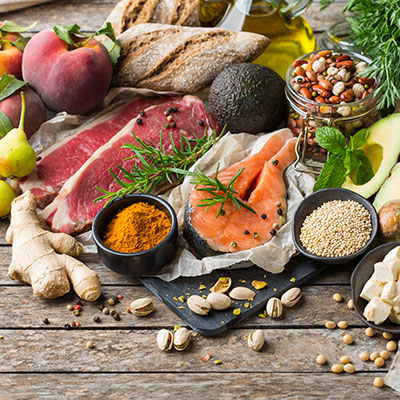
- Tuna and other oily fish such as sardines and salmon
- Low-fat milk with vitamin D
- Egg yolks
- Fortified whole-grain cereals
- Oysters
- Shellfish
- Beef
- Beans
Foods to Avoid to Increase Your Free Testosterone
If you want to boost testosterone in addition to adding foods, there are certain “testosterone killing” foods you must avoid. These include:
- Soy products
- Most dairy products (except those that have been enriched with vitamin D)
- Mint
- Bread, pastries, and desserts
- Licorice root
- Vegetable Oil
- Flaxseed.
- Processed Foods
Generally speaking, a “heart-healthy” diet, one that is high in protein, and low in carbs and fats, is the best to also maintain good testosterone levels.
Can Testosterone Replacement Therapy Increase Free Testosterone?
There are ways to naturally boost your testosterone levels. However, if you have been diagnosed with low testosterone, the only way to treat it is with testosterone replacement therapy.
Exercising more, eating the foods as suggested, and making other lifestyle changes can all help to boost free testosterone levels. But, at a certain age, your body can only produce so much testosterone. If you are over 40 and experiencing the symptoms of low testosterone, chances are you can never raise your levels high enough with lifestyle changes alone.
Testosterone replacement therapy is a safe and effective way for men with below-normal testosterone levels to improve their quality of life. The only way to legally obtain testosterone therapy is with a proper diagnosis of low testosterone and a prescription from a doctor.
Testosterone replacement is available in several forms; however, our doctors have found that testosterone injections are the safest and most effective way to take testosterone.
What Do the Medical Studies Say About Boosting Testosterone?
Taking a deeper dive into the methods mentioned above to naturally raise testosterone, here is what some of the medical research says.
A study published in the prestigious Trusted sourceEffect of 1 Week of Sleep Restriction on Testosterone Levels in Young Healthy MenJAMA NetworkGo to sourceJournal of the American Medical Association (JAMA) found that lack of sleep definitely will lower a man’s testosterone level. The researchers found that after only one week of restricted sleep, daytime testosterone levels dropped by up to 15 percent. By contrast, normal aging sees testosterone decreases of just 1 to 2 percent per year.
According to one report in the Trusted sourceDiet-induced obesity and low testosterone increase neuroinflammation and impair neural functionPubMedGo to sourceJournal of Neuroinflammation , low testosterone levels and being overweight may contribute to a variety of inflammatory conditions and impaired neurological function. This is just one of several studies that link poor diet to lower free testosterone levels.
According to a Harvard Health paper on testosterone and obesity, entitled Obesity: Trusted sourceObesity: Unhealthy and unmanlyHarvard Health PublishingGo to sourceUnhealthy and Unmanly, a 2007 study of men aged 40 and above found that each one-point increase in body mass index (BMI) was associated with a 2% decrease in testosterone. Obesity is defined as BMI is 30 or higher.
A 2014 study published in the Trusted sourceLowered testosterone in male obesity: mechanisms, morbidity and managementNCBIGo to sourceAsian Journal Andrology found that even “moderate obesity” could lead to drops in testosterone, with the researchers concluding, “moderate obesity predominantly decreases total testosterone due to insulin resistance-associated reductions in SHBG.”
As far as the benefits of exercise for boosting testosterone levels, a study in the Trusted sourcePhysically active men show better semen parameters and hormone values than sedentary menPubMedGo to sourceEuropean Journal of Applied Physiology found that the more active an individual is, the more testosterone they will have.
Another study Trusted sourceThe presence of symptoms of testosterone deficiency in the exercise-hypogonadal male condition and the role of nutritionPubMedGo to sourcepublished in 2017 in that same Journal suggested that increasing physical activity was more beneficial than weight loss for improving testosterone levels.
Now that you know a bit more about free testosterone and how to increase your levels, why not contact us today and find out more about the many life-changing benefits of testosterone therapy?
FAQ
What is Testosterone Therapy?
Testosterone replacement therapy is a doctor-prescribed, clinically proven method to treat men and women with low testosterone. Although technically a "male" hormone, testosterone is vital to the health and wellbeing of both men and women. Despite the important role that testosterone plays in strength, energy, vitality, and sexual wellness, testosterone levels dwindle as you age. This can result in low testosterone, a condition sometimes simply referred to as "Low T."
Testosterone replacement therapy has been shown to have many life-changing benefits for men and women suffering from Low T due to age-related testosterone decline.
Why Do You Need Testosterone Therapy?
You may need testosterone therapy because your testosterone levels decline as you age. It is a simple biological fact. A man's testosterone level declines as he ages. Your testosterone level peaks at about the age of 20. After that, you start to lose testosterone at a rate of about 1% to 2% per year. By the time you are 40, most men will begin to feel the signs and symptoms of low testosterone, a condition also known as “hypogonadism.”
As we grow older, age-related testosterone decline may be inevitable. However, testosterone replacement therapy can give you back what the years take away.
Who Should Consider Testosterone Therapy?
Any man who is between the ages of 35 and 65 and may not be feeling as strong and vital as they would like to be should consider testosterone replacement therapy. However, you should watch for these signs of low testosterone. The symptoms of low testosterone include:
- Decrease in libido or sex drive
- An overall feeling of reduced virility and vigor
- Changes in mood
- Erectile dysfunction
- Loss of stamina
- Loss of muscle tone
- Weight gain
- Loss of memory and other cognitive issues
Do I need a Prescription for Testosterone Therapy?
Yes, you absolutely need a prescription for testosterone therapy. The only legal way to obtain testosterone replacement therapy is with a doctor’s prescription. You cannot buy testosterone online or anywhere else without a doctor’s prescription. Buying or using testosterone without a doctor’s prescription is not only illegal; it can be hazardous to your health. Using testosterone that has not been prescribed for you or without a doctor’s proper supervision can cause serious health complications, even death.




